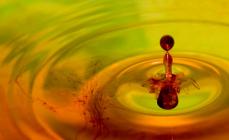In order to satisfy our body's need for iodine, it is necessary to consume as many foods containing it as possible. The most iodine is found in seafood. Below are the foods richest in this microelement:
Cod liver;
- salmon;
- flounder;
- shrimps;
- sugar kelp (sea kale) and so on.
Since residents of almost all regions of Russia lack iodine in their foods, use special iodized products (salt, milk, etc.) in their food.
Iodine during pregnancy
When the need for iodine increases, doctors prescribe iodine supplements in large dosages from the very beginning of pregnancy. Lack of iodine can affect the mental and physical development of the fetus. With a severe lack of iodine, stillbirth can be provoked or lead to cretinism (severe mental retardation) of the baby.
During pregnancy, it is recommended to visit an endocrinologist who conducts tests for thyroid hormones. In case of any violations, this will allow you to prevent bad consequences in a timely manner.
For iodine deficiency
The most visible thing with severe iodine deficiency is the appearance of endemic goiter, that is, an enlargement of the thyroid gland. This condition itself is called Basedow's disease, with the same disease the eyes come out (eyes protrude), the neck swells. Women are most prone to it. With less iodine deficiency, “psychological” immunity decreases, that is, a person becomes lethargic, gets tired quickly, and constantly experiences a feeling of drowsiness. Mental abilities and concentration also suffer. An increase in appetite as a result of constant fatigue can lead to obesity, but it will be difficult to lose weight afterwards. There may be shortness of breath and a choking cough.
Removal of the thyroid gland
In case of some irreversible changes in the thyroid gland, it is necessary to partially or completely remove it. An operation is underway. After removal of the thyroid gland, constant medical supervision is necessary. Hormonal medications are prescribed, and, if necessary, iodine preparations, but only under strict supervision. Self-treatment in this case is excluded.
Iodine preparations
Iodine is used externally as an antiseptic; it is a well-known alcohol solution of iodine, which everyone used to smear their wounds and make iodine nets. This group also includes Lugol's solution for the treatment of sore throat, as well as Iodinol (treatment of sore throat, trophic ulcers, etc.) and some others. But oral iodine medications are prescribed by a doctor. They are also used for iodine deficiency. Below is a list of the most common:
- “Iodomarin” 100, 200 mg tablets;
- “Iodine balance” 100, 200 mg tablets;
- “Microiodide” 100 mg tablets and so on.
brush, user,
Iodine is a chemical element necessary for the functioning of the human body. It is involved in the biosynthesis of hormones and is a component of thyroxine, the thyroid hormone. Lack of iodine in the body causes metabolic and heat exchange disorders. Children's growth and even mental development slows down. But is it possible to drink an alcoholic tincture of iodine, or will it rather harm the body than help it?
It is very important to identify problems with iodine deficiency in the body in time!
Iodine in nature
Surprisingly, the iodine content in the earth's crust is negligible. It is approximately 0.00003%. However, this substance is found in the cells of plants and animals, in sea and river water. Sea water and the organisms living in it are especially rich in iodine. Moreover, the further from the sea, the less iodine is contained in liquids, soil and tissues of living beings. Therefore, residents of coastal regions suffer from iodine deficiency much less often.
Iodine in the body
The adult body contains approximately 20-25 mg of iodine. Of these, 8 mg is concentrated in the thyroid gland, the rest circulates in the blood. Moreover, 90% of all organic iodine in the body is found in thyroxine, a hormone produced by the thyroid gland.
The thyroid gland receives inorganic iodides from the blood. As a result of chemical reactions, organic iodine is synthesized from them, which is necessary for the production of thyroxine. By the way, today iodine is the only trace element whose participation in hormone synthesis is known.

Iodine is directly involved in the synthesis of vital hormones
What is thyroxine?
Thyroxine is produced by the thyroid gland and is an important component of the human body. It is this hormone that is responsible for heat production and energy metabolism. In addition, mental and physical health largely depends on thyroxine. It is necessary for the normal functioning of the central nervous system, affects the functioning of the liver and heart, tissue development, and water-salt balance.
If there is not enough iodine
A lack of iodine in the body causes an enlargement of the thyroid gland, disruption of its functions and the development of a disease such as endemic goiter. This disease has been known to mankind for a long time. From the paintings of Renaissance masters one can judge how widespread it was during that period. Swelling of the neck can be seen in portraits by Rembrandt, Rubens, Van Drake, and Durer.
Goiter has been studied since the beginning of the 19th century. It was then that attention was first drawn to the direct dependence of the spread of this disease and the iodine content in the air, soil and water. Today, endemic goiter is a disease well known to medicine. It occurs in people exclusively in those areas where the iodine content is reduced. Moreover, in many cases the thyroid gland itself in such patients is completely healthy and could function normally under other conditions.

Thyroid diseases are associated with iodine deficiency in the body
In goiter, a lack of iodine causes the thyroid gland to work harder in an attempt to synthesize thyroxine. The organ increases significantly in size and can reach a weight of 4-5 kg! Goiter often causes cancer and may be accompanied by deaf-muteness and paralysis. A lack of iodine is especially dangerous for children - there may be delays in growth and development, and the possibility of cretinism cannot be ruled out.
Iodine in food
The main natural source of iodine for humans is food. First of all, these are seafood - fish, mussels, squid, shrimp, crabs and so on. Iodine is best preserved in dried or freshly salted fish, while heat treatment destroys up to 65% of iodine. It must be remembered that if the water and air are poor in iodine, then the products will not have enough of it.
If there is a lack of iodine in the body, the most effective way to improve the situation is iodized salt. Salt enriched with iodine can be used in cooking and kept in a salt shaker on the table. However, we must remember that it retains its properties for 3-4 months. Pay attention to the expiration date on the packages.

Seafood is the main source of iodine
You also need to know that iodine evaporates if salt is not stored correctly. Damp or lumpy salt most likely no longer has healing properties. When heated, iodine evaporates completely - this must be taken into account when using iodized salt when cooking or frying.
For all its simplicity, this remedy played a big role in the fight against endemic goiter. According to medical estimates, iodized salt has helped more than 12 million children avoid mental disability and developmental problems. It was first used in Switzerland, where goiter was a common disease.
What happens if you take iodine?
If you try to drink an alcohol tincture of iodine, which is usually used for superficial treatment of scratches and abrasions, the result will be disappointing. The temperature will rise sharply, burns will occur to the mucous membrane of the throat, as well as the larynx and stomach, and general symptoms of poisoning will appear. To do this, just one drop of an alcohol solution of iodine is enough!

Treat pharmaceutical forms of iodine with great caution!
Taking 2-3 g of iodine (or 30 ml of tincture) can be fatal. Lugol's solution is less hazardous to health. It consists of 17 parts water, 1 part iodine and 2 parts potassium iodide. It is used to treat sore throats, pharyngitis, and stomatitis. It can also be taken orally. However, this should be done very carefully.
Frequent use of iodine-containing drugs can cause inflammation of the mucous membrane of the upper respiratory tract, skin rashes, and kidney disease. Under no circumstances should such drugs be taken orally for nephritis, tuberculosis, hemorrhagic diathesis, acne, furunculosis and high sensitivity to this substance.
On public transport I witnessed a conversation between two intelligent women. One of them complained of fatigue and malaise, and the other immediately diagnosed: not enough iodine! In the spring, the “doctor” emphasized, it is imperative to take iodine supplements to support the thyroid gland and increase immunity. Our people are truly literate. He knows that without iodine the thyroid gland is not healthy, and if there is a lack of it in the body, a person feels weak, tired, and the skin becomes dry. So similar advice is being given out left and right. There is so much you can read on any medical forum on the Internet! And regarding iodine, they also give “specific” recommendations like: do you want your child to become an excellent student? Feed him with iodine! My husband lost his desire - the same thing. But does everyone need to take iodine-containing medications? Who needs them and who are they harmful? “Narodnaya Gazeta” addressed these questions to endocrinologist Inna SHCHETKO.
Indeed, in the spring, patients often hear complaints related to a lack of vitamins and microelements, the specialist said. - To keep the thyroid gland normal, take multivitamin complexes, which also contain microelements, including iodine.
- Can food make up for its lack?
- Certainly. Iodine is found in persimmons, walnuts, seaweed, seafood, iodized salt, etc. All this compensates for its lack in the body.
- Recently, some scientists have begun to say that Belarusians have already “too much” with iodine and this may threaten health problems.
- If you eat foods that contain iodine, an overdose will never occur. You also need to be reasonable when taking iodine-containing medications, which are primarily necessary for children and adolescents, pregnant and lactating women. By the way, during pregnancy the need for this element almost doubles.
- Many people buy potassium iodide, iodomarin, believing that they can nourish the thyroid gland with the iodine necessary for its smooth functioning. But are these drugs really safe?
- Potassium iodide is a medicine, and therefore should be prescribed according to indications. Now there is even discussion about making this drug available by prescription. Uncontrolled use can cause harm to the body. An overdose of iodine can provoke iodine-induced thyrotoxicosis - this microelement causes an excess release of thyroid hormones, or iodine-induced hypothyroidism - when the iron is “blocked”.
- Is it true that if my relatives have problems with the thyroid gland, then I should also use iodine-containing drugs?
- In each specific case, this should be decided by the doctor. It is believed that iodine deficiency in the country has been eliminated: products are fortified with iodine, iodized salt is used in food, and the choice of seafood is varied. In such cases, there is no need to take additional iodine.
- Now many people are wary about the accident that happened in Japan. Concerned readers call the editor to find out how to protect the thyroid gland.
- It is unlikely that radioactive iodine from Japan will pose a danger to the citizens of our country. On the one hand, the concentration of radioactive substances as we approach Belarus will decrease to non-hazardous levels, on the other hand, the radioactivity of iodine will decrease due to its short half-life. But if someone wants to “play it safe,” they still have to forget about alcohol tincture of iodine: molecular iodine cannot be taken internally. You can use an iodine-containing drug - potassium iodide. In physiological doses it is not dangerous. If a person gets enough iodine from food or dietary supplements, radioactive iodine will not enter the thyroid gland, since there will be no room for it there.
- How can a person figure out whether he has enough iodine or not?
- If the body is deficient in iodine, the thyroid gland enlarges. These changes indirectly indicate iodine deficiency. Symptoms such as lethargy, increased fatigue, and decreased performance may appear. But these signs are nonspecific; they are also characteristic of other diseases. Nodules may appear in the thyroid gland. The only way to prevent all this is to take care of the required amount of iodine in the body.
- Is it possible to independently test for iodine deficiency: draw a grid on your hand with iodine and see how quickly it disappears from the skin?
- Although many people do this, such a test is not a diagnostic indicator of iodine deficiency.
- But many people apply iodine mesh to the chest to get rid of cough.
- This is a distracting therapy that has nothing in common with the real treatment of tracheitis or bronchitis.
The first thing I understood from all the articles and recommendations is that iodine is needed not only for the thyroid gland. Without it, the ovaries, stomach, intestines, mammary glands, and uterus do not work well.It is in these organs that more than 70% of iodine is concentrated, and not in the thyroid gland, as we used to think.Iodine deficiency leads to fatigue, weight gain, hair loss, anxiety, depression, muscle pain,fibrocystic mastopathy , acne, irregular menstruation, ovarian cysts, fibroids, severe manifestations of PMS. A lack of iodine causes dry mouth and decreased sweat production. Yes, they come to me quite often with such unusual symptoms.
What is behind iodine deficiency!?
The amount of microelement decreases with insufficient consumption of foods containing iodine. The most iodine is found in seafood, seaweed, iodized salt, and feijoa. There are traces of iodine in beets, beans, buckwheat, and oatmeal. But it is difficult to talk about replenishing iodine from plant foods, since most of them were grown in soil that is low in iodine. Therefore, iodine deficiency is very common, includingfor vegetarians.During pregnancy and feeding, the need for iodine increases, since it is required for the formation of the child’s body.
What affects the absorption of iodine?
- With a lack of selenium, iodine is not absorbed. The conversion of T4 to T3 decreases, which increases the formation of free radicals in the thyroid gland.
- Iron deficiency leads to low production of thyroid hormones, as this trace element is necessary for the formation of thyroid peroxidase. Bromide, chloride, fluoride, toxic substances from household chemicals and food - reduce the production of thyroid hormones, as they displace iodine.
- An increase in estrogen levels and insulin resistance slow down the absorption of iodine, while high testosterone levels, on the contrary, accelerate it.
Iodine and the female body
For the female body, iodine is an indispensable assistant, as it promotes ovulation, prevents the development of ovarian and mammary cysts, and increases progesterone levels. Progesterone in turnenhances iodine absorption. Iodine helps the liver break down estrogen, which makes cells less sensitive to estrogen , which reduces chest pain, ovarian cysts, and symptoms of PMS.Iodine alters gene expression in the mammary gland . This reduces the negative effects of estrogen on breast cancer. Iodine deficiency leads to increased sensitivity of the breasts, ovaries, and uterus to estrogen, so iodine protects the woman’s reproductive system as a whole.
When I added iodine-rich foods to my diet, I noticed a decrease in symptoms of fatigue, an improvement in hair structure, and a stop to hair loss. Molecular iodine (from algae) is more powerful than ascorbic acid in its anti-inflammatory effect.
Iodine takes part in the work of mitochondria, increases the secretion heat and energy , which is why with iodine deficiency and decreased thyroid function, patients often complain that they cannot keep warm. I also felt the same symptoms for several years. Iodine improvessynthesis of thyroid hormones , and therefore the performance of its functions. Iodine is an antioxidant, participates in detoxification, immune function,death of abnormal cells in the thyroid and mammary glands , which means it protects against tumor formation.
If iodine is so beneficial, the question arises: how much should you take to get the effect and not cause harm?!
According to research, the safest is organic iodine, from algae, for example, from kelp. It enters the thyroid gland more slowly and is absorbed more quickly by the mammary glands.You can start taking iodine with minimal doses, listen to your body and gradually increase the dose. For myself and in my practice, I use only organic iodine from algae, combined with selenium, which reduces risks. Additional iodine protects the thyroid gland from the accumulation of bromine and fluoride, which compete with this mineral for its place in the sun. The daily dose of iodine is 150-200 mcg. According to research, pregnant women should not chase high doses, using iodine in an amount of 250 mcg per day, no more.
What to do if you are still afraid of using iodine, despite its effectiveness and benefits?
- Check the amount of iodine in the body -presence of iodine in daily urine. P Before testing, iodine supplements and foods should be discontinued for 24 hours. Spectral analysis of hair will also tell you about the reserves of iodine and other trace elements in the body. In my practice, it is often spectral analysis that reveals iodine deficiency in patients.
- Determining the level of antibodies to TPO is a marker of latent autoimmune pathology of the thyroid gland, in the presence of which iodine can be used in a dosage of no more than 250 mcg. Increased breast sensitivity can also be a sign of iodine deficiency in your body.
According to research in patients with normal thyroid function, the amount of iodine can be 1.8-3.2 mg per day without side effects. Patients with thyroid disorders tolerate a dosage of less than 1.5 mg per day. Accompaniment with selenium and iron improves the absorption of iodine and reduces negative effects.
Uses of selenium with iodine will help in the presence of antibodies to the thyroid gland, since this combination has an anti-inflammatory effect, it increases the transition of T4 to T3. Selenium dose should not exceed 400 mcg per day, you should start with a dosage of 100-200 mcg per day.
Since 2010, while studying domestic nutritional science with Professor Dadali, I learned the phrase “Iodine cannot be absorbed without selenium!” My practice fully confirms this, as well as the fact that vitamins C, E and iron are needed for the absorption of iodine.
Iron- also a necessary component for the absorption of iodine. In my practice, to replenish iron, I use a preparation that contains chlorella with a destroyed wall, which allows iron to be integrated into our cells as much as possible.
How to check if you need hardware?
To do this, you need to do a blood test for ferritin. This is a protein that is responsible for storing iron in the liver. Normally, it should be in the range of 40-50, the percentage of red blood cell saturation with hemoglobin is 35-38%. These data indicate good iron levels in your body.
If you are still in doubt whether to use iodine or not, look at the people of Japan. Their diet includes 1000-3000 mcg of iodine per day, which promotes longevity and good health. Japan has low rates of cancer, although this country has experienced radioactive contamination more than once.
Every cell in the body needs iodine; low levels of iodine can lead to the development of fibrocystic mastopathy of the mammary gland and a decrease in the production of sweat by the sweat glands of the skin. As a result, our toxins will be locked inside with no way out, and will poison us from the inside. A decrease in thyroid function can occur with iodine deficiency and dry mouth.The study shows that the thyroid gland, skin, salivary glands use iodide, and the mammary gland, prostate gland in men, and stomach require iodine.
Products with iodine can meet your needs, but be careful - you can overdose on iodine from food! Here's how much iodine is found in foods:
- seaweed - up to 800 mcg per 100 g, seafood 10-190 mcg per 100 g,
- iodized salt - 400 mcg per teaspoon,
- 16 mcg is contained in one egg,
- mushrooms, beans, grapes, and leafy greens can also contain iodine in small quantities if grown in soil rich in iodine.
What do I use for myself and my patients?
Here are my favorite products that I use every day and recommend to my patients - Iodoselen and Green Magic (4 types of algae - organic iodine). My favorite products can be ordered here with a 15% discount and no registration required. Discount code 775771. Send your order confirmation via the link to info@website and I will write out an individual drug regimen for you.
An analysis of medical articles and materials from naturopaths finally convinced me that the use of iodine with selenium is completely justified and even necessary for the body and women’s health.
In highly specialized areas, iodine is called a micronutrient. This is not in vain, since it is needed to ensure the occurrence of multiple biochemical reactions in the body. Moreover, it is an indispensable element of human nutrition.
Rules of application
WHO has recognized the problem of ongoing diseases due to the deficiency of this component in the diet as a global one.
The global medical community is concerned because iodine deficiency poses a health threat. Moreover, it is life-threatening.

The pharmaceutical industry offers a variety of iodine-containing medications used both externally and internally. Among them:
- disinfecting alcohol-containing solutions (Iodinol, classic);
- oral agents (Iodonate, Yatren, Iodomarin);
- Iodognost, used for diagnostic purposes as a contrast ingredient in various studies.
When choosing products, you must pay attention to the percentage of the active substance and follow medical recommendations.
Dosage
This is a substance necessary for the production of endocrine gland hormones.
Its maximum daily tolerable value is 1100 mcg. However, the Thyroid Association mentions the risks of taking this substance in excessively high doses. Particularly in the form of supplements, potassium iodide, as well as brown algae.
Daily norms

The Association proposes the following consumption standards (based on the calculation of pure substance) of iodine:
- from one to eight years - 90 mcg;
- from 9 to 13 years - 120 mcg;
- from 14 to 18 years old and adults - 150 mcg;
- pregnant women - 220 mcg;
- during lactation - 290 mcg.
In the case of children under one year of age: from birth to 6 months - 110 mcg, from 7 months to one year - 130 mcg.
If a pregnant woman takes the medicine in high doses, this can lead to miscarriage.
Border regulations
The association also determined the maximum (borderline) tolerable norms of iodine:
- from 1 to 3 years - 200 mcg;
- from 4 to 8 years - 300 mcg;
- from 9 to 13 years - 600 mcg;
- from 14 to 18 years - 900 mcg;
- from 19 and older - 1100 mcg.
In the case of children under one year of age, it is impossible to determine the maximum tolerated norms.
The lethal dose of iodine corresponds to 2 grams, calculated as a crystalline substance.
Therapeutic effect or harm

Uncontrolled use of drugs can lead to poisoning
Is it possible to get poisoned by ingesting the substance in its pure form or iodine-containing medications? Taking any of the iodine-containing drugs can cause poisoning if it is uncontrolled.
Causes of intoxication
You can often become poisoned by iodine if you inadvertently ingest it in excess doses. Chronic intoxication is likely in the case of an incorrectly calculated dosage regimen or as a result of work activity in the workplace where it is used.
Other causes of poisoning are:
- ingestion of external medications;
- deliberate overdose;
- uncontrolled intake;
- ignoring contraindications and incompatibility of the substance with other drugs and substances.
Compatibility

With a high concentration of iodine in the solution, a burn of the mucous membranes appears
Often people who have a deficiency of this element in the body resort to attempts to replenish it. For these purposes, they drink dietary supplements, foods rich in it, various iodine-containing medications, and sometimes an alcohol solution.
We will answer frequently asked questions. What happens if you drink an iodine solution? Can I drink iodine with water? What happens if you drink iodine with milk? Under what conditions is a burn from iodine possible?
Iodine and water
The damaging effect directly depends on the concentration of the solution. At low concentrations, no harm to health will occur.
A highly concentrated solution has a detrimental effect on the protein cellular structure. A chemical burn appears on all mucous membranes.
The person experiences unbearable pain and swelling.
The development of allergic manifestations, up to anaphylactic shock, is likely. If swelling of the larynx or bronchi and lungs occurs, death may occur as a result of suffocation.
Considering that the substance is quickly adsorbed from the gastrointestinal tract into the bloodstream, in such a situation general toxemia may develop with symptoms of damage to the central nervous system, liver, cardiovascular system and kidneys.
Other combinations

As in the first case, when combining it with other drugs, it is necessary to observe the measure. This is due to the relative degree of influence of two or more substances in combination.
For example, milk with iodine is an excellent remedy for the treatment of diseases of the endocrine gland. In this case, milk promotes better absorption of the substance. However, you should be mindful of the doses.
So, for medicinal purposes, you can drop a couple of drops of an alcohol solution into milk and drink it once or twice a week. Abuse can be fraught with undesirable consequences.
So, if you drink iodine with milk in an amount of more than 10 drops, uterine bleeding may develop, as well as acute intoxication.
If you eat it with sugar, then in a matter of seconds your body temperature will rise to 38-39 degrees and higher. This condition will be complicated by the development of symptoms of acute poisoning.
Negative Impact
If you drink iodine in large quantities, general intoxication will occur. In medical terminology, this phenomenon is known as iodism disease.
Acute and chronic development of this disease is likely.
Acute form
This form is characterized by burns of the mucous membranes and damage to the respiratory system, cardiovascular system and central nervous system. Different ways of penetration of a substance into the body cause the following reactions:
- If you inhale vapors, a runny nose, dry cough, excessive tearing and salivation, and a metallic taste in the mouth occur.
- If you drink iodine, a burning sensation and pain appears in the mouth and larynx, as well as the esophagus, intestines and stomach. Strong thirst develops, and when exhaling, the air is saturated with iodine odor. The mucous membranes of the mouth and tongue turn dark brown. Vomiting develops, and the vomit turns yellow or blue (in the presence of starch-containing products). Also, vomit and feces may contain blood.
In more severe situations, the following develop:

- swelling of the respiratory tract;
- decrease in blood pressure;
- paleness or cyanosis of the skin;
- dyspnea;
- unconscious state;
- decreased amount of urine output.
Anaphylactic shock is likely to occur. Under the influence of pain and internal burns, a state of shock can also develop.
Chronic toxemia
Symptoms for this form vary. Basically, a functional disorder of the endocrine gland develops, immunity decreases, and other pathologies are likely to appear:
- iododerma - a pathology characterized by thick rashes merging into a single spot, urticaria, various dermatitis;
- conjunctivitis, blepharitis, etc.
Treatment
You can get a burn from iodine both when taken internally and when used externally. The difference in emergency response measures is due to complications arising from internal use. After all, complications from a substance entering the body orally are characterized by the presence of signs of acute toxemia and internal bleeding.
Primary care

Wash the burn area with water at room temperature.
If a skin burn occurs, it is necessary to rinse the burn site with boiled water at room temperature for 10-30 minutes. Then treat this area with warm soapy water, an aqueous solution of sugar (20%) or sprinkle with chalk or tooth powder.
In the future, to cure the burn, you can use sea buckthorn oil.
What to do if iodine gets on your tongue? After all, the tongue, like the tonsils, has a rather delicate and very sensitive mucous membrane. The action of the product in high concentrations is very aggressive towards living cells, which is fraught with tissue necrosis.
To neutralize the chemical effects of the substance, you can sprinkle a little sugar or tooth powder on your tongue. Then call an ambulance.
It will not be possible to treat a burn to the mucous membrane of the eye and neutralize chemical exposure at home. This procedure is performed in a hospital setting.






